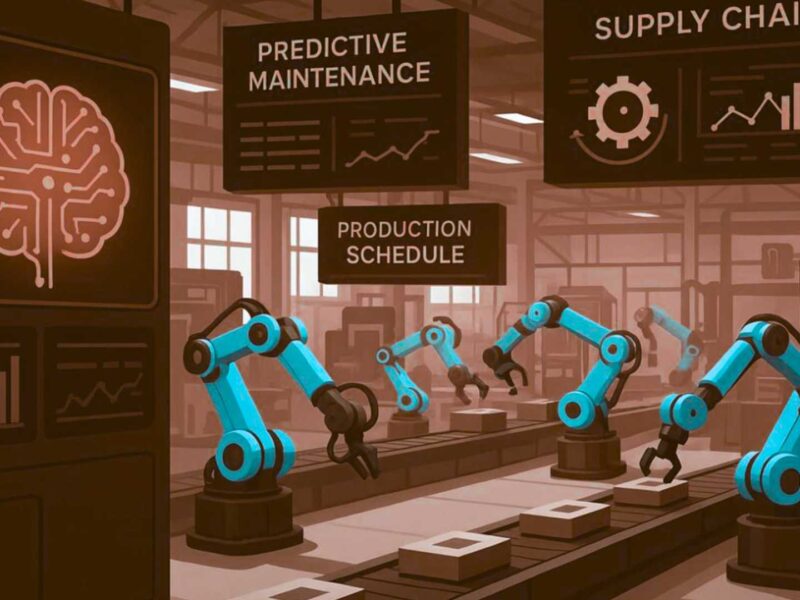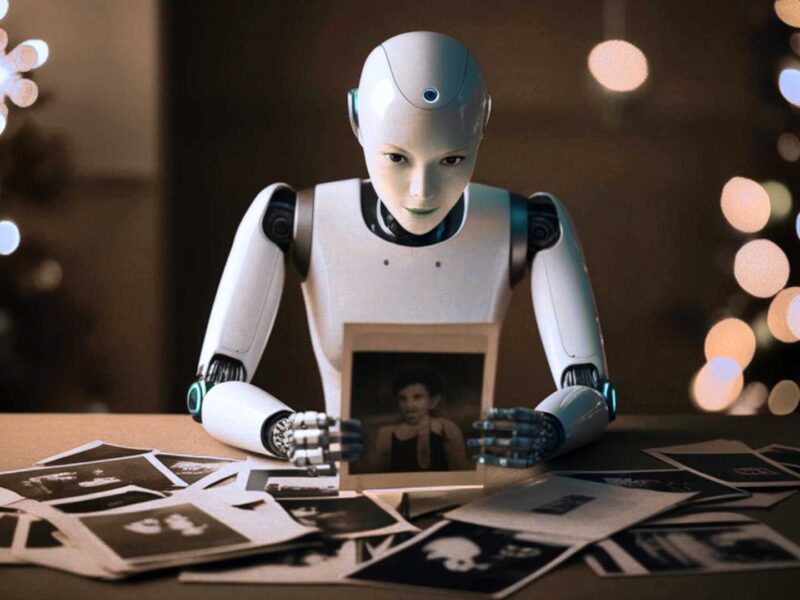AI’s Tangible Impact: Tech Leaders on Process and Skill Shifts
What happens when an algorithm can zap your toughest task in seconds and change the very definition of work?
Artificial Intelligence is shaking things up, redefining not just how we work, but who we are as professionals.
It’s a thrilling mix of adaptation, some nerves, and jaw-dropping opportunities!
To get the real scoop on this tech tidal wave, the Techronicler team reached out to leaders living it every day.
We didn’t want dry theories—we wanted their stories, raw and real.
Our question: “In what concrete ways has AI flipped traditional processes, job roles, or skills in your department or organization? Can you share a specific example of this change and how you tackled it?”
Their bold, heartfelt responses show what it takes to steer a team through this game-changing shift.
Discover how these trailblazers are navigating the AI revolution with grit and vision!
Read on!
Chunyang Shen - Jarsy
The impact of AI has greatly transformed our business, especially in data analysis and customer interactions.
Outdated manual procedures for data evaluation have been supplanted by automated systems that efficiently analyze user spending and investment activities, which enables our team to provide tailored financial guidance to thousands of users simultaneously.
What needs to be done certainly requires more training, in this case, model explanation and supervision rather than conventional data analysis.
For instance, the firm’s financial advisors work side-by-side with AIs to validate proposals confirming that all stipulations have been met while utilizing AI for rapid completion of straightforward tasks.
In this manner, productivity increased by 30% and human experts were able to devote time to manage deeper-level client relations and overhauling strategic planning.

Chunyang Shen
Co-Founder, Jarsy
Prashant Kondle - Tech Innovator
Artificial Intelligence has significantly disrupted traditional workflows in our organization, especially in how product requirements are gathered and translated.
Previously, Product Managers (PMs) owned the end-to-end process of requirement gathering, customer interviews, and converting needs into features. With the rise of AI-driven copilots and requirement generators, Subject Matter Experts (SMEs) are now able to use AI tools to articulate user stories, create mockups, and even simulate workflows—bypassing the need for initial PM involvement.
This has blurred role boundaries and challenged the PM’s position as the central translator between business and tech.
To navigate this shift, we restructured responsibilities. PMs were repositioned to focus on strategic prioritization, validation of AI-generated inputs, and orchestrating cross-functional alignment.
We ran internal upskilling programs to make PMs proficient in AI tooling and prompt engineering, ensuring they could stay relevant and influential in a more democratized product development process.
The outcome: faster prototyping, more accurate requirements from domain experts, and PMs evolving into AI-augmented decision-makers rather than sole requirement gatekeepers.

Prashant Kondle
Technology Innovator, IVIS
Vipul Mehta - WeblineGlobal
One clear disruption came in software QA. Manual testing used to be a big part of release cycles, especially regression and smoke tests. Once AI-driven test automation tools matured—like smart scripts that adapt to UI changes or self-healing test suites—that whole layer started fading out.
In one specific case, a 10-person QA team was spending 60-70% of their time on repetitive browser-based tests. After integrating AI-assisted test automation tools, those tasks dropped to under 15% of their workload. Over six months, the team was trimmed by half, and the remaining testers transitioned into QA automation, performance testing, and writing custom scripts around CI/CD.
Navigating it wasn’t just about cutting roles. It required upskilling—workshops, paired sessions with devs, and reworking job descriptions. Those who embraced scripting and tools stuck around; others moved into different roles or out entirely.
Biggest takeaway: AI didn’t just replace roles, it forced a sharper focus on adaptability and depth. Repetition got automated; insight and engineering got valued more.

Vipul Mehta
Co-Founder & CTO, WeblineGlobal
Luke Enno - Art Unlimited
I work as a content writer at a digital marketing agency. AI has redefined our entire company, affecting many roles. When I started as a contractor with this organization in 2021, several individuals held graphic design-related positions. As of April 2025, we have no one working specifically in graphic design.
In my role, I am now more of a content “curator” than a content writer. In other words, I work with LLMs to create content based on the detailed instructions I prepare for the LLM. I combine the results from four different LLMs to produce a work product (blog article, service page, location page, webpage) that will eventually integrate graphic design elements that I approve.
When I began transitioning from contractor to employee late in 2022 and early 2023, a major focus of my job was creating or recreating websites for new or existing clients. I do very little of that work today (especially since AI tools can do it far more efficiently and effectively).
At one time, the in-house graphic designers and I worked hand-in-hand on many different content-related projects for clients. Today, since there are no graphic designers currently in our organization, I am being trained to use AI tools that can create dozens of design layouts in mere seconds.
Luke Enno
Content Writer, Art Unlimited
Adam Wagner - Raindrop
One tangible shift we’ve seen is in our copy and content workflows.
AI tools now generate first-draft scripts, concepts, and headlines—cutting down ideation time by over 50%. That’s allowed our creative team to focus more on refining and pushing the strategic and emotional layers of the message.
For example, on a recent campaign, AI helped us spin up 20 variations of a concept in a day, something that used to take a full week.
But we didn’t just plug and play—we trained our team to use AI as a creative partner, not a crutch.
The real value came from pairing machine speed with human insight. That’s the future: hybrid creativity.
Will Urbanski - Propified
AI has revolutionized how our real estate brokerage operates, disrupting traditional workflows and reshaping agent skill sets. At Propified, our agents now use AI-powered tools to generate detailed property descriptions in minutes – analyzing neighborhood data, comps, and features to create compelling, data-driven listings.
Client matching has also evolved. AI algorithms now assess buyer preferences, financial profiles, and lifestyle needs to proactively surface ideal properties – often before clients make a request – significantly reducing search time and boosting satisfaction.
One of the biggest shifts came in how agents access market insights. Instead of manual research, AI now delivers real-time data during client conversations – everything from school ratings to development forecasts.
While some veteran agents were initially skeptical, we navigated the transition through targeted training, showing how AI enhances rather than replaces their expertise.
The result: broad adoption, improved close rates, and a redefined set of core competencies for success in today’s market.
Greg Boone - Walk West
The key to using AI responsibly is enhancing not replacing human creativity. AI gives teams time back for deeper thinking, connection, and innovation. For marketers, it means real-time insights to craft personalized campaigns in seconds.
At Walk West, we use AI and automation to elevate authentic storytelling, boost engagement, and drive measurable results. Our team leverages AI tools to streamline processes, brainstorm smarter, and collaborate more efficiently.
By offloading routine tasks, we create space for more meaningful, high-impact work improving both client outcomes and employee experiences.
The real challenge for CEOs isn’t AI’s capabilities, but adoption. Teams may resist change, but leaders can guide them with transparency, education, and strong ethics.
AI is here to stay and that’s a good thing. If embraced thoughtfully, it’s a powerful tool for progress.

Greg Boone
CEO, Walk West
Jennifer Mihajlov - Leading Workplace
Artificial Intelligence, through platforms like Qualee, has transformed how organizations manage and support their workforce.
Companies that once relied on static surveys or gut instinct now use AI-powered tools to capture real-time feedback and identify trends before they escalate.
This shift has disrupted traditional roles in operations, compliance, and communications—demanding more agility, data literacy, and responsiveness. Rather than managing processes manually, teams are now expected to interpret insights and take action quickly.
In sectors like hospitality, retail, and healthcare, Qualee enables businesses to shift from reactive to proactive management, improving performance and retention.
Job roles have evolved as AI automates repetitive tasks and frees teams to focus on strategic thinking and people-centered solutions.
AI hasn’t eliminated the human element—it has elevated it.
By embedding intelligence into everyday workflows, Qualee empowers companies to make smarter, faster decisions and build more adaptive, resilient teams prepared for today’s dynamic workplace

Jennifer Mihajlov
EVP North America, Leading Workplace
Karen Kossow - AI Powered Homeschool
AI has fundamentally disrupted how I operate as both a business owner and a homeschooling parent. It liberates my time, reduces my mental load, and allows me to be more effective in both roles.
Before integrating AI, I spent hours customizing lesson plans and curriculum for my two autistic children. Now, with the help of prompt engineering and generative tools, those tasks are streamlined, turning what used to be my Sunday night stress-fest into a simple 10-minute workflow.
This shift is emblematic of a broader trend: more professionals are choosing to homeschool, driven by unmet special education needs, safety concerns, and the rigid, non-developmentally appropriate demands of modern schools.
AI doesn’t just support this transition, it accelerates it! It offers a scalable way to meet children’s unique needs without sacrificing a parent’s career (or sanity).
At AI Powered Homeschool, we’re building the tools and frameworks to lead this quiet revolution.

Karen Kossow
Founder, AI Powered Homeschool
On behalf of the Techronicler community of readers, we thank these leaders and experts for taking the time to share valuable insights that stem from years of experience and in-depth expertise in their respective niches.
If you wish to showcase your experience and expertise, participate in industry-leading discussions, and add visibility and impact to your personal brand and business, get in touch with the Techronicler team to feature in our fast-growing publication.













